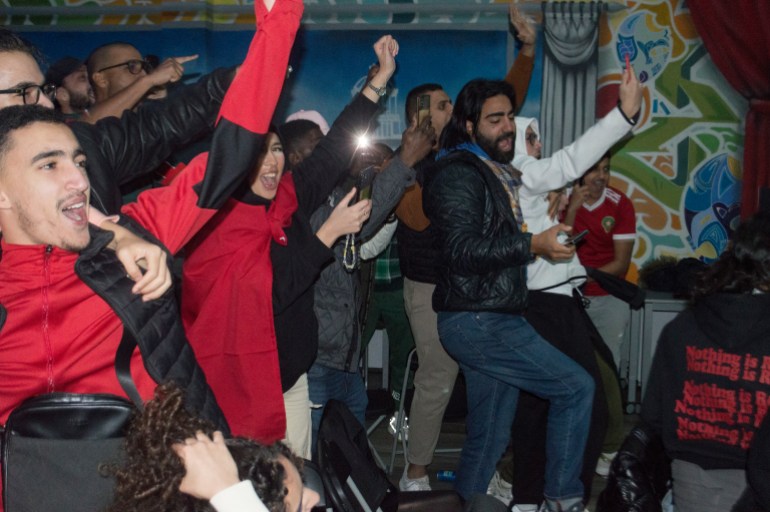Brussels, Belgium – When Morocco scored its second goal and secured its victory over Belgium at this year’s World Cup, a crowded youth centre in Brussels burst into cheers and hugs.
The Belgium capital is home to a sizeable Moroccan diaspora, and on Sunday, some 50 teenagers, young adults and volunteers gathered at Capital’s three-storey art deco headquarters to watch the game.
Young men and women, many of them of Moroccan heritage, sat in chairs in front of the big screen in the building’s atrium to watch the match taking place in Qatar’s Al Thumama Stadium.
A few teenagers sold Coca-Cola, chips and bags of Skittles for one euro near the entrance of the room, and before the match started, there was lots of chatter and cheering as the Moroccan team came on the screen.
University students Omayma Mesmaoui and Basma Abajadi, both 20, came with friends because they wanted a safe space to watch the game.
Holding a Moroccan flag, Mesmaoui said the match was “very important because it is the country of my origin playing the country where I live”. Still, she wanted Morocco to win and predicted a 2-1 victory.
“I’m a little bit lost because my two nations are playing,” said Abajadi, who held a Berber flag for the indigenous group in North Africa.
Abajadi said she was divided over which team to support. But after hearing Belgian captain Kevin De Bruyne say in an interview that his team was “too old” to win at the World Cup, she was now hoping for a draw because of his pessimism.
“It’s because of Kevin I’ve changed my mind,” she said.

When the game began, the crowd quieted down.
“Allez Ziyech!” hollered the teenage boys dressed in all-black and hoodies sitting towards the back, referring to Morocco midfielder Hakim Ziyech.
Capital youth centre founder Hassan al Hilou, 23, himself of Iraqi-Dutch origin, said that one of the centre’s functions is to act as a safe space for people of different backgrounds to gather.
Throughout the match, al Hilou walked around with a big smile, occasionally yelling “Belgium!” good-naturedly teasing the viewers who largely supported Morocco.
Youssef Faraj, 40, a teacher and youth mentor at Capital overseeing the event, said he was cheering for Morocco but worried they weren’t playing at their best.
“We are outsiders. We are not contenders,” he said, noting that Belgium was ranked second in the tournament, while Morocco was ranked 22.
The crowd erupted when Ziyech scored on a free kick, but cheers turned to boos when the goal was called back due to an offside penalty.
At half time, Ayoub, 17, a tall high school student draped in a Moroccan flag, said he was very disappointed that Morocco was not awarded the goal.
“It was disrespectful. It was clearly a goal,” he said. “I feel sad.”
“The second half, we’re going to score two goals,” said Ayoub with conviction. He was easily one of the most dedicated and emotive Morocco fans in the audience.
Ayoub’s prediction turned out to be correct, and Morocco won the game 2-0, and the crowd at the youth centre cheered.
“We didn’t go to Qatar to show that we were bad. We came to Qatar to show Africa was there,” he said. That a “small club in Africa wins [against] a big club in Europe”.
As the room quickly thinned out, Ayoub joined his friends to celebrate and set off some red and green coloured flares for Morocco. The sounds of celebratory car honking could already be heard on the main road outside.
“We are going to say we are here – to say Morocco is not Belgium,” Ayoub said as he walked out, a bounce in his step and with a big holler.
Mesmaoui said she was happy that her 2-1 prediction was close.
“They [Morocco] tried to attack several times. Perseverance is the word of the day. They were very determined.”
For her friend Abajadi, it is also a victory for Belgo-Moroccans.
“Today Belgium is going to explode,” she said, referring to how it is an emotional win for Moroccans. “In any case, it was a win-win.”


